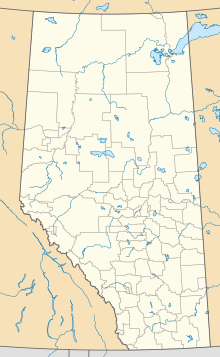Dixonville, Alberta
Dixonville | |
|---|---|
Location of Dixonville in Alberta | |
| Coordinates: 56°32′14″N 117°40′15″W / 56.5372°N 117.6708°W | |
| Country | Canada |
| Province | Alberta |
| Census division | No. 17 |
| Municipal district | County of Northern Lights |
| Government | |
| • Type | Unincorporated |
| • Governing body | County of Northern Lights Council |
| Area (2021)[1] | |
| • Land | 0.64 km2 (0.25 sq mi) |
| Elevation | 640 m (2,100 ft) |
| Population (2021)[1] | |
| • Total | 96 |
| • Density | 150.7/km2 (390/sq mi) |
| Time zone | UTC−7 (MST) |
| • Summer (DST) | UTC−6 (MDT) |
Dixonville is a hamlet in Alberta, Canada within the County of Northern Lights.[2] It is located along the Mackenzie Highway (Highway 35), approximately 43 kilometres (27 mi) north of Grimshaw. It has an elevation of 640 metres (2,100 ft).
The hamlet is located in Census Division No. 17 and in the federal riding of Peace River.
Demographics[edit]
In the 2021 Census of Population conducted by Statistics Canada, Dixonville had a population of 96 living in 38 of its 47 total private dwellings, a change of -11.1% from its 2016 population of 108. With a land area of 0.64 km2 (0.25 sq mi), it had a population density of 150.0/km2 (388.5/sq mi) in 2021.[1]
As a designated place in the 2016 Census of Population conducted by Statistics Canada, Dixonville had a population of 108 living in 37 of its 45 total private dwellings, a change of 3.8% from its 2011 population of 104. With a land area of 0.65 km2 (0.25 sq mi), it had a population density of 166.2/km2 (430.3/sq mi) in 2016.[3]
See also[edit]
References[edit]
- ^ a b c "Population and dwelling counts: Canada and designated places". Statistics Canada. February 9, 2022. Retrieved February 10, 2022.
- ^ "Specialized and Rural Municipalities and Their Communities" (PDF). Alberta Municipal Affairs. January 12, 2022. Retrieved January 21, 2022.
- ^ "Population and dwelling counts, for Canada, provinces and territories, and designated places, 2016 and 2011 censuses – 100% data (Alberta)". Statistics Canada. February 8, 2017. Retrieved February 13, 2017.

